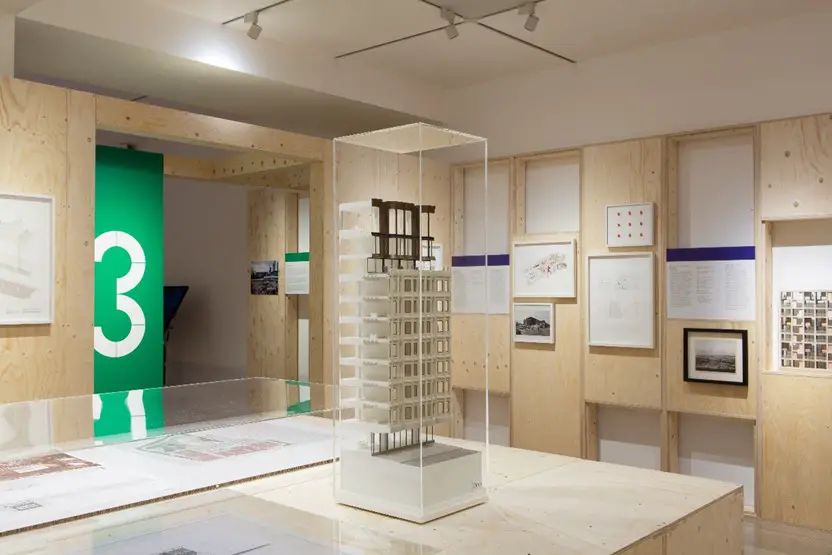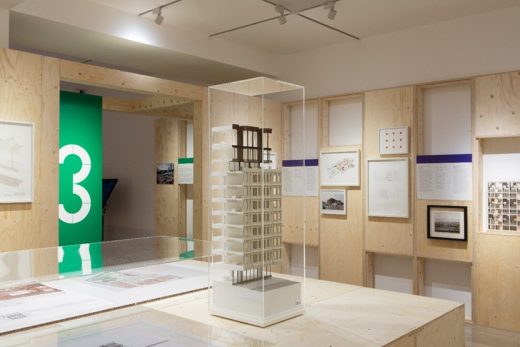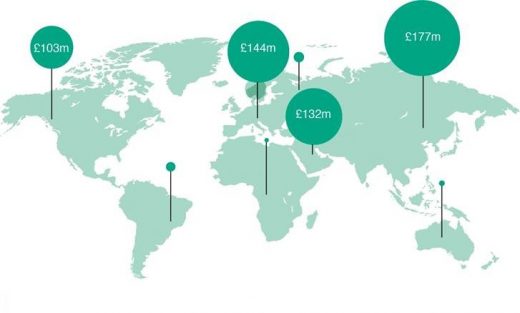RIBA Events 2022, Architecture Gallery London, UK Buildings, Future Trends, British Architects News
RIBA News & Events 2022
Royal Institute of British Architects Exhibition + Talks + Events in London, England, UK
post updated 30 December 2022
RIBA UK News in 2022
Royal Institute of British Architects News for 2022
17 Dec 2022
Confidence remains low as recession looms – RIBA Future Trends November 2022
Findings from our monthly report of the business and employment trends affecting the profession.
The Royal Institute of British Architects (RIBA) has published the latest Future Trends survey results, a monthly report of the business and employment trends affecting the architects’ profession.
In November, the RIBA Future Trends Workload Index fell by 1 point to a balance figure of -21. In the next three months, 12% of practices expect workloads to increase, 34% expect workloads to decrease and 54% expect them to remain the same.
All the monitored work sectors remain in negative territory, with private housing the lowest at –21, down 4 points from October. 32% of practices expect their workloads in this sector to deteriorate over the next three months. The commercial and community sectors also fell a further 4 points this month, posting –12 and –14, respectively. The public sector is the only sector to show some improvement, posting a figure –10, up by 2 points from October.
The outlook among small practices (1 – 10 staff) has broadly held steady, with a score of -25, up from -26 last month. 35% of small practices expect workloads to decrease, whilst 11% expect them to grow. Overall, large and medium-sized practices (11+ staff), have dipped into negative territory this month, returning a balance figure of –2, down from +15 in October. Large practices (50+ staff) remain more pessimistic about future work than medium sized practices (11 to 50 staff).
Confidence continues to be weak across the country, with all regions posting negative figures. However, there are some signs of positivity; London has posted a figure of –26, up by 6 points from October. And in the Midlands & East Anglia, there are signs of improvement too, posting a score of –21, up by 2 points. All other regions have however fallen further into negative territory – South of England (-35), Wales & the West (-26), and the North of England (-22).
In terms of staffing:
• After signs of recovery in October, when the Future Trends Permanent Staffing Index stood at zero, in November, it returned to negative territory, posting a figure of –6.
• 11% of practices expect to employ fewer permanent staff over the coming three months, and 6% expect to employ more. 83% expect their permanent staffing levels to stay the same.
• The proportion of practices anticipating falling workloads (34%) exceeds the proportion expecting staff reductions (11%).
• Medium and large-size practices (11+ staff) now have a negative outlook for future staffing levels, with a combined Staffing Index figure of -10. Small (1 – 10 staff) practices continue to expect falling permanent staff numbers with an Index figure of -5.
• Across all regions, the outlook is poor. London is the most likely to see a fall in permanent staffing levels, down 10 points this month to -13. The Midlands & East Anglia (-5) and the North of England (-4) also remain in negative territory. After posting positive figures in October, Wales & The West ( -5) and the South of England (-5) have now fallen into negative territory.
• The Temporary Staffing Index fell by 5 points in November to -6.
• Levels of personal underemployment have increased, with 21% reporting personal underemployment, compared to 13% in October.
RIBA Head of Economic Research and Analysis, Adrian Malleson, said:
“With no growth anticipated in any of the monitored regions or sectors – the profession’s confidence remains low.
Whilst the rate of deterioration has slowed – the index dropped by just one point this month – workloads are significantly lower that they were a year ago – down overall by 8%.
Time and again, practices report that local planning delays are causing projects to slow, stall, or be abandoned altogether. There are reports too that the latest hike in interest rates has also caused planned funding for some projects to fall through.
As a recession looms, the sector continues to grapple with rising inflation and material and constructions costs alongside a scarcity of tradespeople.
Small-scale domestic work has been hit particularly hard. With people having less disposable income, and mortgages now either unavailable or too expensive, architects are receiving fewer new enquires, a reduced pipeline of work, and increased pressure on fees. In contrast though, some practices describe how some project types, including high-end domestic projects and retail-supporting warehouses, continue to provide a steady stream of work.
During these turbulent times, we will continue to prove high quality support to our members – so they can adapt and innovate their business models. As always, we will report our findings to the Government and work with other built environment bodies to monitor ongoing trends.”
9 Dec 2022
Serjeant Award for Excellence in Architectural Drawing News
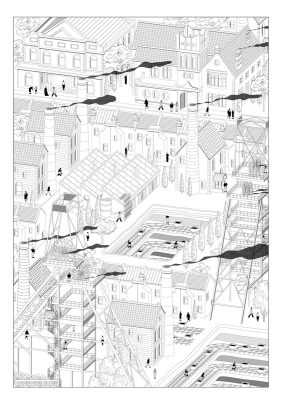
image courtesy of Nathan Tipping-Stevenson
RIBA Serjeant Award for Excellence in Architectural Drawing
8 Dec 2022
2022 RIBA Charles Jencks Award News
The Jencks Foundation and the Royal Institute of British Architects (RIBA) are pleased to announce the 2022 recipient of the RIBA Charles Jencks Award is Forensic Architecture. This annual award is given to an individual or practice who has made a major contribution to both the theory and practice of architecture:
2022 RIBA Charles Jencks Award
18 Nov 2022
RIBA response to the UK Government Autumn Statement
The Royal Institute of British Architects (RIBA) has responded to the Autumn Statement.
RIBA President, Simon Allford, said:
‘We very much welcome the Chancellor’s clear statement that we must improve the energy efficiency of our buildings. The extra funding is welcome. But, to meet the scale of the challenge, and for people and our economy to benefit from the relief, it needs to be accelerated
‘Improving the energy efficiency of our buildings will reduce bills, create jobs and improve the health and well-being of those who live in and use them.
‘The taskforce announced today to oversee these vital changes must learn from past failures and build a competent, skilled supply chain. As an institute and profession, we will continue to engage with, and wherever possible support the government, as it drives forward the vital programmes of work to retrofit our building stock. Time is of the essence.’
18 November 2022
RIBA Reinvention Award News
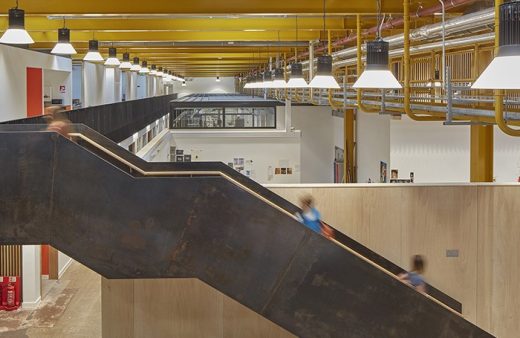
photograph © Paul Rafferty
RIBA Reinvention Award
The Royal Institute of British Architects has launched a new award to recognise achievement in the creative reuse of existing buildings. The award, championed by RIBA President Simon Allford, has been created to shine a light on the importance of retrofitting and its contribution towards achieving net zero.
16 Nov 2022
RIBA announces circular economy exhibition open call
RIBA invites members to submit projects exemplifying the advancement of circular economy design principles to be displayed at 66 Portland Place, London from early 2023. Complementing the recent launch of RIBA’s new exhibition Long Life, Low Energy: Designing for the circular economy, up to 12 winning entries will be showcased in the First Floor Gallery, running for approximately two to three months.
The open call begins 16 November 2022 and will close at 9am 12 December 2022. The judging panel will be chaired by RIBA Board Member Jo Bacon, alongside a member of the RIBA curatorial team. All entrants will receive an invitation to the opening event for the open call show.
Members can submit projects completed during 2022 under one or more of the following headings:
- Buildings that use sustainable or recycled materials as core construction components in built environments
- Buildings that are self-sufficient or net positive in energy consumption buildings
- Buildings that are demountable and no longer linear in terms of lifespan, with materials and components allowing for future re-use
- Buildings that have successfully been re-configured structures for reuse without the need for demolition
Entrants should submit one photograph, one drawing and one paragraph of text (100 words max) describing the project and the importance in relation to circular economy principles. Please see the open call webpage for detailed entry information and submission requirements.
Entries should be sent by email to [email protected]
Previously on e-architect:
10 Nov 2022
Looming recession fuels market fears – RIBA Future Trends October 2022
In October, the RIBA Future Trends Workload Index fell by 3 points to a balance figure of -20. In the next three months, 12% of practices expect workloads to increase, 32% expect workloads to decrease and 56% expect them to remain the same.
All the monitored work sectors have once again posted a negative balance. The private housing sector has posted the lowest figure – remaining the same as last month, at -17. The biggest fall in confidence has been in the public sector, which posted a balance figure of –12, down from –8 in September. This is closely followed by the community sector, posting a score –10, compared to -7 last month. The commercial sector, which includes offices, retail, and entertainment has fallen by 1 point to -8.
Levels of confidence continue to vary by practice size. The outlook among small practices (1-10 staff) has fallen further, with a score of -26, down from -21 in September. 35% of small practices now expect workloads to decrease whilst only 9% expect them to grow. In contrast, large (50+ staff) and medium-sized practices (11+ staff), remain optimistic about future workloads, returning a combined balance figure of +15, the same as last month.
Confidence continues to fall in all regions. London remains the most pessimistic, posting a balance score of –32, down from –23 in September. 40% of London-based practices now expect workloads to fall. Outside of the capital, the South of England and the Midlands & East Anglia have both slipped further into negative territory this month, posting -27 and –23 respectively. In other regions there are some signs of pessimism abating. Wales and the West has posted a figure of –5, up from –17 in September and the North of England has posted a score of –3, up from –5.
In terms of staffing:
• Following a fall into negative territory in September (-6), the index rose this month to zero, suggesting stable permanent staffing levels in the coming months.
• In the next three month, 8% of practices expect to employ fewer permanent staff, 8% expect to employ more, and 85% expect permanent staffing levels to stay the same.
• Overall, medium (11+ staff) and large (50+ staff) practices are positive about future staffing levels, with a combined figure of +9. Small (1 – 10 staff) practices continue to expect falling permanent staff numbers with an index figure of -2.
• Regionally, the picture is mixed. Both Wales & The West (+14) and the South of England (+5) have returned positive figures for October. While still negative, London has somewhat recovered this month, returning a score of -3. The Midlands & East Anglia (-5) and the North of England (-5) also returned negative Index figures this month.
• The Temporary Staffing Index remained negative, posting a balance figure of -1 in October, compared to -2 in September.
• Levels of personal underemployment have decreased again slightly; in October 13% reported being personally underemployed in the previous month, compared to 16% in September.
RIBA Head of Economic Research and Analysis, Adrian Malleson, said:
“In the context of wider economic and political uncertainty – architects’ confidence in future workloads has continued to fall. Current workloads are just 92% of what they were a year ago.
From planning delays to product cost inflation, PII cost and exclusions, and projects failing to progress past design stages as costs become clear, practices are grappling with persistent challenges.
However, when comparing our current figures to previous downturns, one significant difference emerges: pessimism about future work has not resulted in widespread anticipation of staff losses. In our post-Brexit environment, qualified, talented architectural staff are hard to recruit and retain. So far practices are, overall, seeking to keep staff.
Once again, our findings suggest the architects’ market is entering a challenging period of contracting workloads. To mitigate a prolonged recession, the UK must invest in creating sustainable homes and infrastructure now. This will help to increase productivity and tackle the climate emergency head-on.
3 Nov 2022
RIBA awards record amount of financial support to architecture students
Thursday 3 November 2022 – This year marked the highest number of Part 1 and Part 2 students awarded bursaries and scholarships totalling £213,000.
The Royal Institute of British Architects (RIBA) announced the 37 recipients of five 2022 bursary and scholarship schemes – the RIBA Part 1 and Part 2 Bursaries, RIBA Wren Insurance Association Scholarships, RIBA John and David Hubert Bursaries, and RIBA Goldfinger Bursary. The unprecedented financial support benefitting talented and deserving students was made possible by the generosity of donors to the RIBA.
RIBA President Simon Allford said:
“The financial challenges facing students of architecture have never been greater, exacerbated by the current cost of living crisis and the hidden costs of architectural education. Funding schemes such as
these provide a vital lifeline to students, releasing them from some of the financial pressure and allowing them to both focus on their studies and to enjoy their life outside of academe.
I thank all our donors – Joanna Lewinski, the Rosenberg Memorial Fund, Donald and Nancy Notley, Margot Auger, the Wren Insurance Association, and the families of Ernö Goldfinger and Kenneth Mark – for their
immense generosity which has allowed the RIBA to award a record number of bursaries and scholarships to students to help ease their financial burden.”
The 26 recipients of the 2022 RIBA Part 1 and Part 2 Bursaries are:
RIBA Part 1 Bursaries
· Nehla Abdul Majeed – University of Westminster
· Shabina Ahmed – De Montfort University
· Ultima Alif Jahan – Kingston University
· Eleanor Benayoun – Cardiff University
· Md Tanjir Chowdhury Anik – University of East London
· Norah Dankwah – Central Saint Martins, UAL (Rosenberg bursary)
· Kenneth Dhillon – Cardiff University
· Zelal Edis – Loughborough University
· Lewis Johnson – University of Dundee (Rosenberg bursary)
· India Marsh – Manchester School of Architecture (Rosenberg bursary)
· Elianne Pekoulis David – University of Brighton
· Busenur Simon – Manchester School of Architecture
RIBA Part 2 Bursaries
· Olamide Adeyemi – University of Cambridge (Rosenberg bursary)
· Oluwatobi Ajiwe – Royal College of Art (Joanna Lewinski bursary)
· Francesca Brown – De Montfort University (Notley bursary)
· Billy Cameron – University of Greenwich (Kenneth Mark Bursary)
· Lewis Endersby – University of Sheffield (Boyd Auger bursary)
· Mara Fetche – Bartlett School of Architecture, UCL (Joanna Lewinski bursary)
· Joseph Franklin – Kingston University (Joanna Lewinski bursary)
· Edwin Maliakkal – Bartlett School of Architecture, UCL (Joanna Lewinski bursary)
· Qamelliah Nassir – Royal College of Art (Rosenberg bursary)
· Manal Omar – University of Greenwich (Joanna Lewinski bursary)
· Melissa Parsons – University of Cambridge (Joanna Lewinski bursary)
· Oliver Porteous-Williams – University of Bath (Rosenberg bursary)
· Thomas Richardson – Central Saint Martins, UAL (Joanna Lewinski bursary)
· Daniel Stokes – Bartlett School of Architecture, UCL (Joanna Lewinski bursary)
1 Nov 2022
RIBA Chief Executive
RIBA announces new Chief Executive
Dr Valerie Vaughan-Dick MBE has been announced as the new Chief Executive of the Royal Institute of British Architects (RIBA).
Dr Valerie Vaughan-Dick MBE:

photo © Grainge Photography
Tuesday 1st of November 2022 – Valerie has had an extensive career in transformation, strategic development and delivery. Currently Chief Operating Officer at the Royal College of General Practitioners, she has previously held senior leadership positions at the Ministry of Justice, the Department for Transport and the National Audit Office, as well as Board-level roles at a wide range of charities and trusts.
Valerie will take up the role in January 2023 and take forward our Biennial Action Plan 2022-23.
RIBA Board Chair, Jack Pringle, said: “I am delighted we have appointed Valerie as Chief Executive. Valerie’s successful track record in financial transformation and experience in forming international and professional partnerships will prove invaluable as we continue to transform RIBA and deliver our ambitious plans in support of members – and all those passionate about architecture – wherever they are based in the world.”
Valerie Vaughan-Dick said: “I am delighted to be joining RIBA at such an exciting time in its development and to being part of the transition to an even more effective business, where sustainability is top of the agenda. In this post-pandemic and financially challenging era, the industry needs an agile and dynamic membership body to provide leadership and support on the issues that matter most to the profession and the public. I look forward to working with the Board, Council and the expert staff team to help deliver RIBA’s ambitious plans and ensure that RIBA members are appropriately represented, and their contributions widely recognised.”
Valerie will join RIBA on 9 January 2023, taking over from interim CEOs Adrian Dobson and Pamela Harding.
Valerie Vaughan-Dick biography
Dr Valerie Vaughan-Dick MBE is currently Chief Operating Officer (equivalent of Chief Executive) at the Royal College of General Practitioners, which represents more than 53,000 family doctors across the UK and overseas. Valerie has held senior leadership roles in central and local government and in the private and voluntary sectors, working for large, complex organisations with responsibility for multi-million-pound budgets. Beginning her career in the National Audit Office, she has worked on value for money and financial audits of the Departments of Health & Social Security, Overseas Services, Local Government and Housing.
She has extensive experience in the built environment, has been a Chair of an NHS Trust and is the current Chair of a housing association in south London. She joined the RCGP in 2014 and was appointed to her current role in 2017. While at the College, she has overseen significant transformational change whilst ensuring stability for the organisation during the pandemic.
With College Chair Professor Martin Marshall, she has led work to promote equality, diversity and inclusion within the College and general practice, and developed a strong focus on employee engagement. She is a qualified accountant and has a PhD in Management from the University of London and a Leadership Certificate from Harvard Business School. She was awarded an MBE in the Queen’s Birthday Honours 2022 for her services to general practice and to ethnic minority communities.
20 Oct 2022
RIBA President responds to the resignation of PM Liz Truss
RIBA President Simon Allford said:
“In a week’s time we’ll be ushering in the third Prime Minister of the year. This perpetually revolving door of ministers throws business certainty out the window, stifling hopes for recovery.
The new Prime Minister’s agenda must prioritise finding real solutions to the real problems we face – the climate, energy and cost of living crises. These are unprecedented times of great uncertainty – we need stability.
We will be engaging with the new Government and encouraging them to draw on the expertise in our industry, to help make our buildings and communities fit for the future.”
20 Oct 2022
Architects’ outlook worst since financial crash of 2009 – RIBA Future Trends September 2022
Thursday 20 October 2022 – in September, the RIBA Future Trends Workload Index fell by 9 points to a balance figure of –17: the lowest score, outside of lockdown since the great recession. In the next three months, 16% of practices said they expect workloads to increase, 32% expect them to decrease and 52% expect them to remain the same.
All the monitored work sectors have posted a negative balance, and three have shown a further deterioration in confidence since August. The private housing sector has fallen to a balance figure of -17, down from –9. This is a fall of 37 points in the year from January, and a 59 point fall compared to the all-time peak of +42 in May 2021. The commercial sector fell a further 5 points in September, returning a figure of -7, down from -2. There has been a slight increase in optimism in the public sector this month, with a balance figure of -8, compared to -9 in August. The outlook for the community sector remains negative, with a balance score of -7 this month, compared to -6 in August.
Levels of confidence continue to differ by practice size.
Smaller practices (1-10 staff) are the most pessimistic about future workloads. With 35% of small practices now expecting workloads to decrease, they have posted a balance figure of -21, down from -12 last month. Medium and large practices (11+ staff) practices have seen confidence fall, returning a combined figure of +10, down by 10 points compared to August.
Confidence in future workloads is low across all regions. London is the most pessimistic region, with a balance score of -23 in September, down from -7 in August. On average, workloads in London practices are 86% of those seen a year ago. Elsewhere, Wales & the West has seen a slight decrease in pessimism, -17 compared to –22 in August. The South of England (-20) and the Midlands & East Anglia (-21) have both slipped further into negative territory. The North of England has dropped into negative territory for the first time since June 2020, returning a Workload Index score of -5.
In terms of staffing:
For the first time in two years, the RIBA Future Trends Permanent Staffing Index fell into negative territory, at -6, this is down 8 points from August.
13% of practices expect to employ fewer permanent staff over the coming three months, whilst 7% expect to employ more. 80% expect permanent staffing levels to stay the same.
Medium and large-size practices (11+ staff) anticipate staff reductions in the coming three months, with a combined Staffing Index figure of -3. Small practices also expect a fall in permanent staff numbers, returning a figure of –6.
All regions but one (Wales & the West at +5) are now in negative territory. London has posted a Staffing Index figure of -19, down from –4, with 20% of practices here expecting to employ fewer permanent staff in the coming three months. The Midlands & East Anglia (Staffing Index -6), The South of England (-2), and the North of England (-5) have also returned negative figures.
The Temporary Staffing Index fell further to -2, compared to -1 in August.
Levels of personal underemployment have decreased slightly; in September 16% reported being personally underemployed, compared to 17% in August.
RIBA Head of Economic Research and Analysis, Adrian Malleson, said:
“This month’s findings are stark – aside from lockdown, architects are now more pessimistic about future workloads than at any time since the financial crisis of 2009.
We see pessimism across all regions and sectors. Of note, in the capital, nearly a quarter of practices expect workloads to contract in the coming three months. And looking at the private housing sector which had seen a post-Covid
boom, confidence has fallen rapidly.
Brexit, inflation, rising interest rates, post-Covid recovery, the war in Ukraine, and crumbling market confidence in UK fiscal policy all continue to weigh down on the UK economy and the construction sector.
We can likely expect a contraction in architects’ workloads in the coming months, and into next year. A return to growth depends in part on the UK’s response to the energy crisis, on whether we begin in earnest to create a design-led, sustainable built environment.
4 Oct 2022
Belfast Stories Design Competition, Northern Ireland
Belfast Stories Design Competition
The Royal Institute of British Architects (RIBA) has launched a competition on behalf of Belfast City Council, seeking an integrated design team for their ambitious Belfast Stories project. This is to be a unique visitor destination of unprecedented scale and ambition in the heart of the city centre, that will catalyse economic, social, and cultural regeneration in the city and wider region.
1 Oct 2022
RIBA responds to Government sanctions against Russia
Friday 30 September 2022 – The UK Government has today announced a new suite of sanctions in response to Putin’s illegal annexation of Ukrainian regions, states the RIBA. Targeting vulnerable sectors of the Russian economy, the new export ban includes architectural services.
RIBA President, Simon Allford, said:
“The UK Government has announced new sanctions aimed at restricting Russia’s access to professional business services, including architecture.
Whilst many of our members have already taken proactive steps and suspended their work and projects in the country, all Members and Chartered Practices must now ensure they adhere to the new restrictions. Please note that this adherence will be a legal obligation and failure to comply will result in serious consequences, including being in breach of RIBA Codes.
We will continue to work with the Department for Business, Energy & Industrial Strategy (BEIS) to assess how the sanctions will impact the sector. Our Ukraine crisis hub will be updated with the latest information and guidance.”
Any queries should be directed to [email protected].
New United Kingdom Prime Minister Liz Truss – Comment
Monday 5th of September 2022 – “This is an opportunity to refocus and prioritise” – RIBA calls on Liz Truss to deliver long-term energy efficiency improvements
RIBA President Simon Allford said:
“As people and businesses grapple with soaring inflation and surging energy prices prompting major fears about heating homes this winter, Liz Truss has a colossal task on her hands.
While some form of immediate relief is clearly vital, Truss must also prioritise long-term energy efficiency improvements. This includes protecting funding for Energy Company Obligation (ECO) and implementing a National Retrofit Strategy to significantly reduce home energy consumption and create thousands of jobs across the country.
Building safety and planning reforms cannot fall to the wayside. Truss must also prioritise embedding clear, robust building safety and accessibility requirements into regulations, properly resourcing planning departments, and ensuring long overdue planning reforms deliver the types of high-quality homes we need.
This is an opportunity for the Government to refocus and prioritise. Buildings are critical to our quality of life and wellbeing. Everyone deserves a comfortable, safe and sustainable home, and architects are uniquely placed to deliver that reality. We will be engaging with the Prime Minister and her Government immediately.”
18 Aug 2022
RIBA July 2022 Future Trends News
In summary:
- In July the RIBA Future Trends Workload Index held steady, returning the same balance figure as in June, +4.
- Over the next three months, 22% of practices expect workloads to increase, whilst 61% expect them to remain the same and 18% expect a decline.
- Architects expect workloads to fall across all sectors apart from the commercial sector, which returned a balance figure of +1, up from –2 in June. Private Housing, which had been in positive territory since June 2020, has fallen to a balance figure of 0.
- Small practices (1 – 10 staff) posted a positive balance of +2 in July, a recovery of 3 points on June’s figure of -1. Large and medium-sized practices (11+ staff) remain positive about future workload, returning a balance figure of +20
- In July, the RIBA Future Trends Permanent Staffing Index returned a balance figure of +2, the same as in June.
- Whilst current workloads are holding up, and personal underemployment remains low confidence for the next 3-6 months is wavering as concerns around the economy and inflation grow.
3 Aug 2022
2022 RIBA Norman Foster Travelling Scholarship Winner
2 Aug 2022
Muyiwa Oki Elected RIBA President
21 July 2022
Confidence hits lowest levels since January 2021 – RIBA Future Trends
In summary:
• In June, the RIBA Future Trends Workload Index fell by nine points to a balance figure of +4.
• Whilst architects remain confident about future workloads, confidence is at its lowest level since January 2021.
• Over the next three months, 22% of practices expect workloads to increase, whilst 60% expect them to remain the same and 18% expect a decline.
• Architects expect workloads to fall across all sectors apart from private housing.
• While large and medium-sized practices remain firmly positive, small practices (1 – 10 staff) posted a figure of -2, down by 13 points, and the first negative balance for this group since January 2021, the time of England’s third lockdown.
• The RIBA Future Trends Permanent Staffing Index dropped four points to +2. Whilst still positive, the recruitment outlook for employees is softening.
• Overall, practices report having as much work now as they did last year and the number reporting personal underemployment is lower than it has ever been.
21 July 2022
Stirling Prize 2022 Shortlist
The UK’s most prestigious architecture award is given to the architect of the building thought to be the most significant of the year for the evolution of architecture and the built environment. The six buildings contending for the coveted 2022 RIBA Stirling Prize:
– 100 Liverpool Street
by Hopkins Architects
– Forth Valley College – Falkirk Campus
by Reiach and Hall Architects
– Hackney New Primary School and 333 Kingsland Road
by Henley Halebrown
– Orchard Gardens, Elephant Park
by Panter Hudspith Architects
– Sands End Arts and Community Centre
by Mæ Architects
– The New Library, Magdalene College
by Niall McLaughlin Architects
7 July 2022
UK Government Building Policy 2022 News
UK Government Building Policy 2022
16 June 2022
Optimism returns despite economic uncertainty – RIBA Future Trends May 2022
Thursday 16th of June 2022 – in May, the RIBA Future Trends Workload Index rose by eight points, to a balance figure of +13, and over the next three months 29% of practices expect workloads to increase, 16% expect them to decrease and 56% expect them to remain the same.
The private housing (+12) and commercial sectors (+6) both saw recovery, climbing five and three points respectively, while the public sector (-3) and community sector (-7) remained pessimistic about future workloads.
In terms of practice size, all expect workloads to increase: small practices (1-10 staff) posted a balance figure of +11, up by eight points, and large and medium-sized practices (11+ staff) returned a balance figure of +23, an increase of four points.
Regionally, the picture appears largely positive too, with the Midlands & East Anglia (-22) being the only region to record a fall in confidence. Wales & the West (+10) and the North of England (+29) continued their run as the most positive regions, London rose to +22 after three months of falling confidence, and the South of England recovered from last month’s dip to +16.
In terms of staffing:
• The RIBA Future Trends Permanent Staffing Index increased by one point to +6.
• 12% of practices expect to employ more permanent staff over the coming three months, 6% expect to employ fewer, and 83% expect staffing levels to stay the same.
• Medium and large-size practices (11+ staff) anticipate an increase in permanent staff, returning a combined balance figure of +19, down slightly from last month’s figure of +27.
• Smaller practices (1 – 10 staff) also anticipate employing more staff, with an increased figure of +4.
• Anticipated demand for staff is highest in the South of England (+13), while Wales & The West (+10), London (+7) and the North of England (+4) all posted positive balance figures. The only practices expecting to employ fewer staff are based in the Midlands & East Anglia.
RIBA Head of Economic Research and Analysis, Adrian Malleson, said:
“After a notable dip in confidence last month, the RIBA Future Trends Workload Index has recovered; architects appear optimistic about workloads and practices plan to recruit.
However, this is against a backdrop of continued economic uncertainty and deteriorating growth forecasts for the UK. Practices remain resilient, but the profession continues to face headwinds, and we can expect the coming months to be challenging for architects, the construction industry, and the wider economy.
Commentary received paints a mixed picture. Some practices report strong levels of enquires translating into commissions, while domestic and commercial work continues to be in demand.
However, some practices report the effects of project cost inflation; enquiries failing to translate into appointments, and projects cancelled as costs become clearer to clients. Delays in the planning process also continue to put a brake on project delivery, especially in protected sites and areas.
8 June 2022
RIBA and Scott Brownrigg launch annual £5,000 prize fund to support sustainability research

image courtesy of The Royal Institute of British Architects
RIBA Scott Brownrigg Award for Sustainable Development 2022
The Award, now calling for applications, funds research to address environmental and ethical issues and enhance the quality of life of communities across the globe. It will offer £5,000 to an individual or team to develop an architecture research project, lasting between three and twelve months, that focuses on one or more of the 17 Sustainable Development Goals of the United Nations.
26 May 2022
RIBA HQ refurbishment
RIBA HQ refurbishment, 66 Portland Place
The Royal Institute of British Architects (RIBA) has announced Benedetti Architects as the Lead Architect for the refurbishment and modernisation of 66 Portland Place, a Grade II* listed building. This project forms part of the RIBA’s House of Architecture initiative to inspire members, professionals, students and the public through physical and virtual debate, discussion, learning and exhibitions.
19 May 2022
Architects’ confidence dips as broader economy weakens – RIBA Future Trends April 2022
Thursday 19th of May 2022 – in April, the RIBA Future Trends Workload Index fell by 14 points to a balance figure of +5. In the next three months, 23% of practices expect workloads to increase, 18% expect them to decrease and 59% expect them to remain the same.
Of the four sectors, three experienced a confidence dip, with just two remaining in positive territory. The commercial sector posted a slightly reduced balance figure of +3; the private housing sector posted a figure of +7 (down 10 points from March, and 35 points over the last 12 months); the public sector fell into negative territory for the first time since August 2021 with a balance figure of -3; and the community sector remained at -2.
Whilst practices of all sizes still expect workloads to increase, the extent of this optimism has dropped across the board. Small practices (1-10 staff) posted a positive balance figure of +3, a reduction of 13 points, and large and medium-sized practices (11+ staff) returned a balance figure of +19, down from +36 in March.
While the South of England was the only region to move into negative territory – dropping 25 points from +15 to -10 – it was not alone in appearing less confident. London also saw a fall, decreasing by 14 points since March, and 32 points since February, returning a balance figure of +8, and Wales & the West posted a score of zero, down 24 points on March. Meanwhile the North of England held steady, dropping just one point to +17, and optimism increased in the Midlands & East Anglia, where practices returned a balance score of +6, a one-point increase.
In terms of staffing:
• The RIBA Future Trends Permanent Staffing Index dropped by 4 points to +5.
• 12% of practices expect to employ more permanent staff over the coming three months, whilst 6% expect to employ fewer. 82% expect staffing levels to stay the same.
• Medium and large-size practices (11+ staff) are more likely to recruit staff in the coming months, with a combined balance figure of +27; a positive outlook for recruitment, but one that is down from last month’s balance figure of +42.
• Optimism among smaller practices (1 – 10 staff) appears more muted. Practices returned a slightly reduced index figure of +2.
• Anticipated demand for staff is highest in London (+8), the South of England (+8), Wales & The West (+9) and the North of England (+3). While the practices in the Midlands and East Anglia appear more pessimistic at -8 and 12% expect a reduction in permanent staff numbers over the next three months.
RIBA Head of Economic Research and Analysis, Adrian Malleson, said:
“The RIBA Future Workloads Index has fallen by 14 points this month, the biggest monthly drop in confidence since the early days of the pandemic.
Working in the context of a complex and weakening economic backdrop, architects are having to grapple with challenges including rapidly rising inflation, significantly increased energy costs, continuing supply chain issues, cost of living increases, and ongoing difficulties implementing the agreed trading arrangements with the EU.
Commentary received highlighted concerns over the rising cost of projects, in terms of both labour costs, practice salaries and increased materials and energy costs. Unpredictable and rapid, these rises are proving to hinder both project pricing and cash flow management. Ongoing delays in the planning process also continue to hamper project delivery.
Despite these challenges, the index remains resilient, with commentary citing full order books and new enquiries – signifying that demand for both quality design and small-scale domestic work remains.
Nevertheless, the strong levels of optimism seen in the immediate aftermath of the pandemic restrictions easing, remain on a downward trend.”
5 May 2022
2022 RIBA Yorkshire Award Winners
2022 RIBA Yorkshire Award Winners
4 May 2022
2022 RIBA Southeast Award Winners
2022 RIBA Southeast Award winners
2 May 2022
2022 RIBA West Midlands Awards Winners
2022 RIBA West Midlands Awards Winners
1 May 2022
2022 RIBA Northwest Awards Winners
2022 RIBA Northwest Awards Winners
29 Apr 2022
2022 RIBA East Midlands Award Winners
2022 RIBA East Midlands Award Winners
28 Apr 2022
2022 RIBA Northeast Award Winners
27 Apr 2022
Built environment sector bodies unite to improve diversity, equity and inclusion
UK Built environment diversity, equity and inclusion
Key membership bodies in the built environment sector have signed a Memorandum of Understanding (MoU) to drive forward the creation of a more diverse, equitable and inclusive sector – ensuring it is more representative of the society it serves.
21 Apr 2022
Optimism dips as economic growth slows – RIBA Future Trends March 2022
The Royal Institute of British Architects (RIBA) has published its latest Future Trends survey results, a monthly report of the business and employment trends affecting the architects’ profession.
In March, the RIBA Future Trends Workload Index fell by four points to a balance figure of +19.
30% of practices said they expect workloads to increase in the coming three months, whilst 59% expect them to remain the same and 11% anticipate a decrease. Larger practices remain the most optimistic.
Private housing remains the most positive sector, followed by commercial, although both sectors saw a slight weakening of confidence; as did the community sector, which slipped back into negative territory.
While all regions remain positive about future workloads, some appear less confident, with London-based practices seeing the largest confidence drop, falling by 18 points, followed by the North of England, falling by 13 points to +18.
All other regions saw a rise: Wales & the West posted a balance score of +24, up 2 points; the South of England rose by a point to +15; and the Midlands & East Anglia (the least optimistic region over the last few months) returned a two-point figure increase to +5.
Overall, workloads are up by 4% compared to this time last year and permanent staff levels have increased by 2%.
Practices of all sizes remained positive. Small practices (1-10 staff) posted a positive balance figure of +16, down two points from +18, while large and medium-sized practices (11+ staff) returned a combined balance score of +36.
In terms of staffing:
• The Permanent Staffing Index remained positive, but fell slightly by 2 points to +9.
• 16% of practices expect to employ more permanent staff over the coming three months, 7% expect to employ fewer and 78% expect levels to stay the same.
• Medium and large-size practices (11+ staff) continue to be the drivers of staff levels increases, returning a combined balance figure of +42, while smaller practices also remain positive at +3.
• All regions anticipate rising permanent staffing levels, with London and Wales & The West returning the highest Staffing Index of +11.
• The Temporary Staffing Index fell again slightly by 3 points to +3, while personal underemployment stayed constant, with 11% reporting being personally underemployed.
RIBA Head of Economic Research and Analysis, Adrian Malleson, said:
“March saw a slight fall in optimism, aligning with a national economic picture of slowing growth, rapidly rising inflation and the backdrop of an ongoing war in Ukraine. But, overall, architects remain positive about future workloads and are seeking to employ more staff.
Commentary received shows that cost pressures on architects, clients, contractors, and product manufacturers show no signs of easing. Rising energy and commodity prices, along with global supply chain disruption, have led to the price of building materials rising by around 20% over the last year.
While most practices (57%) have not experienced any projects being put on hold or abandoned, over a quarter (26%) report having had at least one project put on hold in the design stages, and 17% report one or more projects being abandoned over the last three months. 19% said at least one project has been put on hold in the construction stages, while 3% have experienced abandoned schemes. Reports of stalled or abandoned projects arise mostly from smaller practices, which suggests they are likely domestic. Are clients thinking twice before embarking on home renovations amid a growing cost of living crisis? We can expect this to be reflected in surveys over the coming months.”
12 Apr 2022
2022 RIBA Norman Foster Travelling Scholarship
2022 RIBA Norman Foster Travelling Scholarship
6 Apr 2022
RIBA and British Council to celebrate heritage conservation in China and UK
Wednesday 6th of April 2022 – The Royal Institute of British Architects (RIBA) and the British Council are pleased to launch the Open Door project, celebrating outstanding architecture conservation work in the UK and China.
Drawing on the substantial heritage sites in both countries, Open Door will highlight the cultural and environmental benefits of heritage conservation, including its contribution to tackling the climate emergency through the effective re-use of existing buildings.
The project will invite emerging architects, researchers, practitioners, designers and academics in China and the UK to submit case studies of heritage restoration projects. These will join a pool of buildings selected from the RIBA International Awards and RIBA National Awards over the past two decades.
An Expert Advisory Group, chaired by Ben Derbyshire, Past President of the RIBA and Commissioner for Historic England, and made up of conservation industry leaders in China and the UK, will select a total of 14 winners. These will be exhibited online later this year by the British Council and RIBA, through photographs, drawings and films.
RIBA Director of International, Azlina Bulmer, said:
“We are delighted to be collaborating with the British Council on this exciting initiative. Cultural heritage is high on the agenda in China, with the loss of many heritage sites in recent decades, and the UK is renowned for its restoration of historic buildings. Open Door will highlight the importance of preserving our historic buildings, and will foster the vital sharing of information between experts in both countries.”
Director of Arts at British Council China, Rehana Mughal, said:
“The British Council has long been committed to the arts and cultural exchange between the UK and China. The UK is well known for its varied historical and contemporary architecture and its commitment to architecture conservation, I’ve also seen great examples of architecture preserving the past while facing the future here in China too. Through the Open Door project in partnership with RIBA, we want to celebrate and share the inspiring work from both countries, and enable further knowledge exchange between China and the UK.”
Open Door will open for entries on Thursday 21 April and the online exhibition will take place on Thursday 15 September.
5 Apr 2022
RIBA opens £30K funding scheme for architecture students
‘Sarajevo Conservation Forum’ by Amy Crellin, 2021 Wren Insurance Association Scholarship recipient:
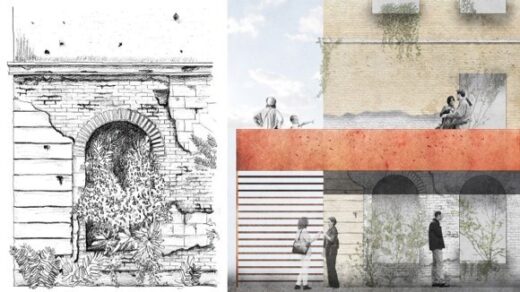
Tuesday 5th of April 2022 – The Royal Institute of British Architects (RIBA) has today opened applications for five RIBA Wren Insurance Association Scholarships, worth a total of £30,000.
The annual scholarships are open to students who are currently enrolled in the first year of their RIBA Part 2 course in the UK. Each recipient will receive £6,000 and the opportunity to be mentored by an architect Member of the Wren Insurance Association throughout their second year.
The scheme, which was set up in 2013, has supported 45 recipients to date.
RIBA President Simon Allford said:
“These scholarships are vital to support students, and reward and retain talent in the profession. We are very grateful to the Wren Insurance Association for their ongoing generosity, guidance and support to architecture students over the years.”
The deadline for applications is 12:00 Monday 6 June 2022. Further information is available here.
23 Mar 2022
RIBA reacts to Chancellor’s Spring Statement
The Royal Institute of British Architects (RIBA) has responded to the HM Treasury’s Spring Statement.
RIBA President, Simon Allford, said:
“It’s positive to see HM Treasury recognise that it has the power to make energy efficiency a reality for households. Measures to scrap VAT on home energy-saving upgrades such as insulation, solar panels and heat pumps are encouraging – and go some way to answer our call to use tax mechanisms to make greener options more achievable.
The Government must now build on this. Decarbonisation and fuel poverty reduction both rely on a comprehensive National Retrofit Strategy with long-term funding and incentives. Today’s measures signal progress – but efforts must be rapidly scaled-up.”
Further comment, not from the RIBA:
Trevor Morriss, Principal, SPPARC said: “Whilst I am pleased to see the Government’s new programme of cheap loans for retrofitting projects, I am concerned that this seems to be a reincarnation of the failed Green Homes Grant. If the government invested the same amount they are spending on the Palace of Westminster refurbishment into low-carbon heating solutions and insulation, almost 19 million homes could be upgraded by 2030.
Retrofitting, however, will only go so far in greening homes and protecting households from the downsides of the UK’s dependency on fossil-fuel heating. Government and industry must harness the impact that higher building standards will have so that we can ensure the delivery of high-quality and sustainable homes that are fit for a net-zero future and seek genuine renewable solutions“
17 Mar 2022
Essential Approved Documents for construction professionals available from RIBA Books
Four new Approved Documents have been launched as part of Building Regulations in the UK, and now available to buy as hard reference copies from RIBA Books.
The new Approved Documents include two brand new and two updated documents.
The documents which have been updated are: Ventilation: Approved Document F, and Conservation of fuel and power: Approved Document L, which are now available in two volumes each.
The new documents are: Overheating: Approved Document O, and Infrastructure for charging electric vehicles: Approved Document S, which reflect two areas of significant new development and increased focus in the built environment over recent years.
These are important reference documents for architects and other construction professionals, including building surveyors, and specialist contractors in roofing, heating and passive house certification, alongside electrical infrastructure engineers. The hard reference copies are an essential addition to any office.
The documents will come into force on 15 June 2022.
Find more information and purchase your copies here: ribabooks.com/approved-documents
17 Mar 2022
All sectors set for growth for the first time since pandemic began – RIBA Future Trends February 2022
The Royal Institute of British Architects report that in February 2022 the overall RIBA Future Trends Workload Index grew by five points to +23, and all sectors, practice sizes and regions demonstrated a positive outlook.
Looking ahead to the coming three months, 32% of practices expect workloads to increase, 58% expect them to stay the same and only 10% expect them to decrease.
For the first time since the pandemic began, all sectors were positive. The private housing sector climbed three points to +23, the commercial sector rose to +10 and both the public sector and community sector increased slightly to +1.
Practices of all sizes remained confident about future workloads. Small practices (1 – 10 staff) returned a positive balance figure of +18 and large and medium-sized practices (11 – 50 and 51+ staff) remained firmly positive at +48. In summary, most mid-to-large sized practices (56%) expect workloads to grow.
London also saw a confidence boom, climbing from +16 to +40 – its highest balance in two years. The North of England (+31); Wales & the West (+22); South of England (+14); and Midlands & East Anglia (+3) also all remained in positive territory.
In terms of staffing:
• The RIBA Future Trends Permanent Staffing Index increased by two points to +11.
• 15% of practices said they expect to employ more permanent staff over the coming three months, 80% expect levels to stay the same and only 4% expect to employ fewer.
• All practice sizes said they remain positive about staffing levels, although staff recruitment remains highest among medium and large-sized practices (11+ staff).
• Appetite to recruit remains strongest in London. With an overall balance figure of +18, 26% of practices in the capital said they expect to employ more permanent staff in the coming three months.
RIBA Head of Economic Research and Analysis, Adrian Malleson, said:
“February saw an encouraging rise in optimism across all sectors and regions, especially in the capital, where practice revenue and workload has been hit particularly hard by the pandemic.
It’s important to note however, that this data was collected before the Russian invasion of Ukraine, and the picture of economic stability might be short lived. The conflict is likely to compound existing supply and inflation issues, and rapidly increase energy prices which, once again, demonstrates the urgent need for the UK to implement an effective, well-funded and designer-led retrofit programme.
As ever, we are on hand to provide the support and resources our members need.”
9 Mar 2022
RIBA opens applications for bursaries and funding schemes worth over £170k
Wednesday 9 March 2022 – The Royal Institute of British Architects (RIBA) has opened applications for funding schemes to support students at Part 1 and Part 2, worth over £170,000. This year, boosted by generous additional donations, the RIBA can double the funds available.
The new RIBA John and David Hubert Bursary, revised RIBA AHR Scholarship and RIBA Goldfinger Bursary will support students from underrepresented backgrounds in need of financial assistance.
2022 RIBA Bursaries and Scholarship
28 Feb 2022
2022 RIBA London architecture awards news
2022 RIBA London Awards shortlist
8 Feb 2022
RIBA Future Trends January 2022
Thursday 17 February 2022 – 2022 starts strong with housing sector boom, but supply challenges remain – RIBA Future Trends January 2022
In January 2022 the overall RIBA Future Trends Workload Index was positive, remaining at +18. Looking ahead to the coming three months, 31% of practices expect workloads to increase, 55% expect them to stay the same and only 13% expect them to decrease.
Once again, the private housing sector expects to grow the most, returning a balance figure of +20, up six points from December. The commercial sector (+6) and public sector (0) remained on the cusp of positive territory, despite experiencing a confidence drop. The community sector remained at -1.
Reassuringly, all practice sizes continue to be confident about future workloads. Small practices (1 – 10 staff) returned a positive balance figure of +16, up by one point; large and medium-sized practices (11 – 50 and 51+ staff) also remained positive, returning a figure of +33; and half of mid to large sized practices expect workloads to grow.
Across the country, the outlook looks broadly positive, apart from the Midlands & East Anglia, where confidence levels fell sharply to -5 from +15. London remained confident at +16, up nine points from December; the North of England rose by 12 points to +40; the South of England also climbed to +18; and Wales & the West remained at +26.
In terms of staffing:
• The RIBA Future Trends Permanent Staffing Index increased by one point to +9.
• 14% of practices expect to employ more permanent staff over the coming three months, 5% expect to employ fewer and 81% expect levels to stay the same.
• With a combined balance figure of +22, expectations for staff recruitment remains highest among medium and large-sized practices (11+ staff). Small practices (1 – 10 staff) also expect staffing levels to increase but have a more cautious approach, returning a balance figure +6. Only 10% of smaller practices are looking to take on more staff.
• All regions said they anticipate the number of permanent staff to increase, with recruitment levels strongest in Wales. One in five practices in the region are looking to recruit.
• Personal underemployment fell by two points to 11%.
RIBA Head of Economic Research and Analysis, Adrian Malleson, said:
“Overall, 2022 has had a strong start, and architects seem to be looking forward to the coming months with confidence. After two years of unprecedented swings in the monthly workload predictions, some stability has returned to the sector, and we can see workloads are continuing to increase. The commentary received in January paints a positive picture, as practices report strong levels of enquiries and new work coming in. The housing sector is particularly optimistic.
Nevertheless, significant supply challenges remain, as a shortage of materials, tradespeople, and professionals puts a brake on growth. Inflationary pressures are mounting, and escalating costs and reduced availability of construction materials continues to impact project delivery. Some practices even report clients abandoning projects in the face of rapidly inflating product costs.”
8 Feb 2022
RIBA reacts to appointment of new Housing Minister
The Royal Institute of British Architects (RIBA) has reacted to the new appointment of Stuart Andrew MP as Housing Minister at the Department for Levelling Up, Housing and Communities (DLUHC).
RIBA President, Simon Allford, said:
“We welcome Stuart Andrew into this key role and hope he can quickly get to grips with the very immediate and multifaceted housing crisis facing people up and down the country. But this is an extraordinary situation – he’s the 11th Housing Minister in as many years.
With the Government highlighting the importance of improved housing in its levelling-up agenda, it must now work to secure consistent and effective leadership in this area.
I hope to meet with the new minister soon, to discuss how we can share expertise and successfully progress the regeneration of our towns and cities. With the right skills and adequate funding, we can deliver the wealth of warm, safe and healthy homes that this Government has promised.”
4 February 2022
RIBA reacts to Government cash boost for households hit by soaring energy prices
The RIBA has today reacted to the Government announcement that millions of households will receive £350 of support to help protect them from rising energy costs.
RIBA President, Simon Allford said:
“With energy prices skyrocketing, many households will welcome this direct financial support.
But this is a short-term fix, and the Government now needs to address the wider issue – the UK has some of the most energy inefficient homes in Europe.
The building fabric of the country’s housing stock must urgently be upgraded, and we need to move away from a reliance on gas heating – both to reduce carbon consumption and to ensure homeowners are less vulnerable to volatile gas prices.
This is a significant challenge, but one the Government must rise to through a well-funded National Retrofit Strategy with a clear roadmap for action.
Through retrofitting homes, we will both enhance people’s health and wellbeing and reduce carbon emissions, helping us to meeting our target of net-zero.”
17 January 2022
2021 ended with uptick in confidence– RIBA Future Trends December 2021
In December 2021 the overall RIBA Future Trends Workload Index remained in positive territory and rose six points to a balance figure of +18. Looking ahead to the coming three months, 29% of practices expect workloads to grow, 59% expect them to remain the same and 12% expect workloads to decrease.
Throughout 2021, the RIBA Future Trends Workload Index remained positive, hitting a high of +31 in June, and a low of +3 in January. For the year, the average index figure was +21. This compares to -7 in 2020.
December saw actual workloads reported to be 6% greater than 12 months previous. All practice sizes remained confident about future workloads, as did all regions. The Housing, Commercial, and Public Sectors are expected to grow over the coming three months, however, the outlook for the Community sector remains pessimistic.
In December, the private housing sector posted a balance figure of +14, up one point from November. Consistently the strongest sector during the year, it averaged a balance figure of +25 in 2021, and a high of +42 (in May). The commercial sector recovered from the previous month’s fall, with a December balance figure of +12, up 5 points.
Rising 3 points from November’s balance of +2, the public sector again matched the sector’s modest 2021 high of +5. The community sector remained negative, with a -1 balance score, up two points from the previous month’s -3.
Small practices (1 – 10 staff) posted a positive balance figure of +15, up 6 points from November’s figure of +9. Large and medium-sized practices (11 – 50 and 51+ staff) continue to show consistently high levels of optimism. The December balance figure for mid to large-sized practices was +38, up from +32 the previous month.
2021 ended with all regions being positive about workloads for the first quarter of 2022. London remains optimistic about future workloads, but that optimism softened as the year ended. With a balance figure of +7, December saws a 19 point drop in confidence when compared to November.
The North of England remains firmly positive with a balance of +28, up from +24 the previous month. During 2021, the North of England was the most optimistic region, on average. Wales & the West posted the highest balance score this month, ending a year of optimism for the region with a balance figure of +26. After a dip in confidence last month, the South of England returns to optimism with a Future Workload Index of +13. The Midlands & East Anglia (+15) also ends the year on a positive note.
In terms of staffing:
· The RIBA Future Trends Permanent Staffing Index has risen from 0 to +8. This increased balance score is due solely to fewer practices expecting to see a decrease in the number of permanent they employ.
· Overall, 13% of practices expect to employ more permanent staff over the coming three months, whilst 5% expect to employ fewer. 83% expect staffing levels to stay the same.
· With a combined balance figure of +48, expectations for staff recruitment remains highest among medium and large-sized practices (11+ staff), 46% of whom expect numbers to increase (up 8% from November), while just 4% expect a decrease (down from 19%).
· Though also positive, small practices (1 – 10 staff) remain more cautious in their plans for recruitment, with a balance figure of +3. Nevertheless, this marks a recovery from November’s figure of -3.
· In December, the regional picture for permanent staffing picture strengthened with no region being pessimistic about future permanent staffing levels.
· London and the North of England both returned an index figure of +11, the South posted a figure of +10 and Wales & The West + 9. The Midlands & East Anglia has returned a zero balance figure this month.
· The Temporary Staffing Index fell back somewhat in December, closing the year at +3.
· This month personal underemployment fell by one point to 13%.
RIBA Head of Economic Research and Analysis, Adrian Malleson, said:
“2021 ended with a small uptick in confidence as, on balance, practices continue to be optimistic about coming workloads.
After the unprecedented difficulties of 2020, 2021 saw a recovery in confidence and workloads led by the housing sector, followed by the commercial sector.
London, the UK’s largest architecture market by far, saw the biggest drop in confidence at the start of the pandemic and took the longest to regain confidence. However, by the end of 2021 London had seen ten successive months of confidence in future work. All regions are now optimistic with the North of England and Wales & The West consistently outperforming other regions throughout the year.
Risks for 2022 remain, however, with ongoing challenges around the availability and cost of construction products, a shortage of skilled tradespeople, planning delays, rising PII costs, a looming cost of living crisis that may dampen domestic demand, and risks to the macro-economy from weak growth and rising inflation.
The effects of the Omicron variant are yet to be fully realised, however, early indications suggest that despite very high infection rates, the hit to the economy will be significantly less than that of previous waves.
The commentary received gives a mixed picture. On one hand, practices describe how material cost inflation, twinned with shortages of both materials and people, is causing project delays and making tendering increasingly difficult. On the other, practices report full pipelines of work and healthy levels of new enquires. For some, 2021 has been among their busiest years, with enquiries having to be turned away. There are looming challenges, but overall architects are optimistic about the months ahead.
RIBA is reporting findings to Government and working with other bodies in the built environment to monitor ongoing trends. We continue to be on hand, providing support and resources to our members.”
11 January 2022
RIBA 66 Portland Place in London, UK
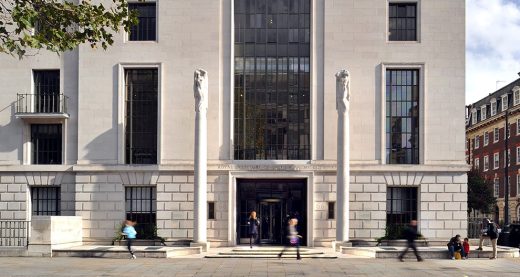
RIBA London HQ Redevelopment Architect
RIBA seeks practice to lead London HQ redevelopment
Tuesday 11 January 2022 – The Royal Institute of British Architects (RIBA) is seeking Expressions of Interest (EOI) from RIBA Chartered Practices for the design and planning of a comprehensive refurbishment of 66 Portland Place in London.
The winning team will lead the project to deliver a fully accessible building that reflects the RIBA’s commitment to climate action whilst providing flexible facilities for members, staff and visitors.
As Lead Architect, the selected practice will help to develop design options, costs and feasibility for the full refurbishment of the building. It will be expected to manage the project, co-ordinate the design team members, and determine next steps of the strategic masterplan.
RIBA Chartered Practices are invited to submit their Expressions of Interest, outlining their approach, relevant skills, team roles, case studies and references by 2pm GMT on 1 February 2022.
The winning team will be selected from a shortlist of up to six, by a panel comprising: Simon Allford, RIBA President; Simone de Gale, RIBA Board member and Honorary Treasurer; Liam McConnell, RIBA Head of Estates & Facilities; Murray Orr, RIBA Board member (Business & Enterprise); Jack Pringle, Chair of the RIBA Board; MaryAnne Stevens, RIBA Board member (Heritage); Alan Vallance, RIBA Chief Executive and Sarah Williams, RIBA Architect Adviser. Each shortlisted team will receive £5,000 + VAT.
RIBA President, Simon Allford, said:
“This presents a great opportunity for a practice to join our team and play a key role in the transformation of 66 Portland Place into an accessible 21st century building, and an exemplar of re-use and sustainable design. The building will be a physical stage for our ‘House of Architecture’ concept – a space where members, visitors and RIBA colleagues can find inspiration, stimulation and make connections. I encourage all Chartered Practices to register interest, and help deliver us a rejuvenated home, fit for the present and the future.”
RIBA Architect Adviser, Sarah Williams, said:
“This is an exceptional opportunity to help facilitate RIBA’s aspirations for the masterplan and design of an exemplary refurbishment of its Grade II* listed building at 66 Portland Place. It’s critically important that we ensure its continuation, relevance and legacy for future generations and I very much look forward to being part of the process.”
For more information visit here.
RIBA London Events 2022 information from The Royal Institute of British Architects
Location: 66 Portland Place, London, England, UK
Previously on e-architect:
RIBA UK News Archive
RIBA News & Events 2021
RIBA announces winners of 2020 President’s Medals
RIBA President’s Medals Student Awards 2020
RIBA News & Events 2020
RIBA News 2019
National Museum of African American History and Culture building:
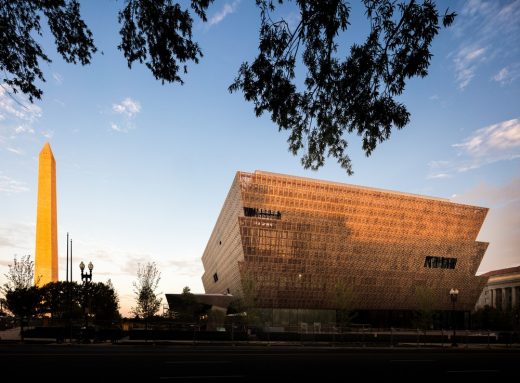
photo © Darren Bradley
RIBA Gold Medal for Architecture
London Architecture Events
Bartlett School of Architecture Event
Comments / photos for the RIBA News & Events for 2022 page welcome

